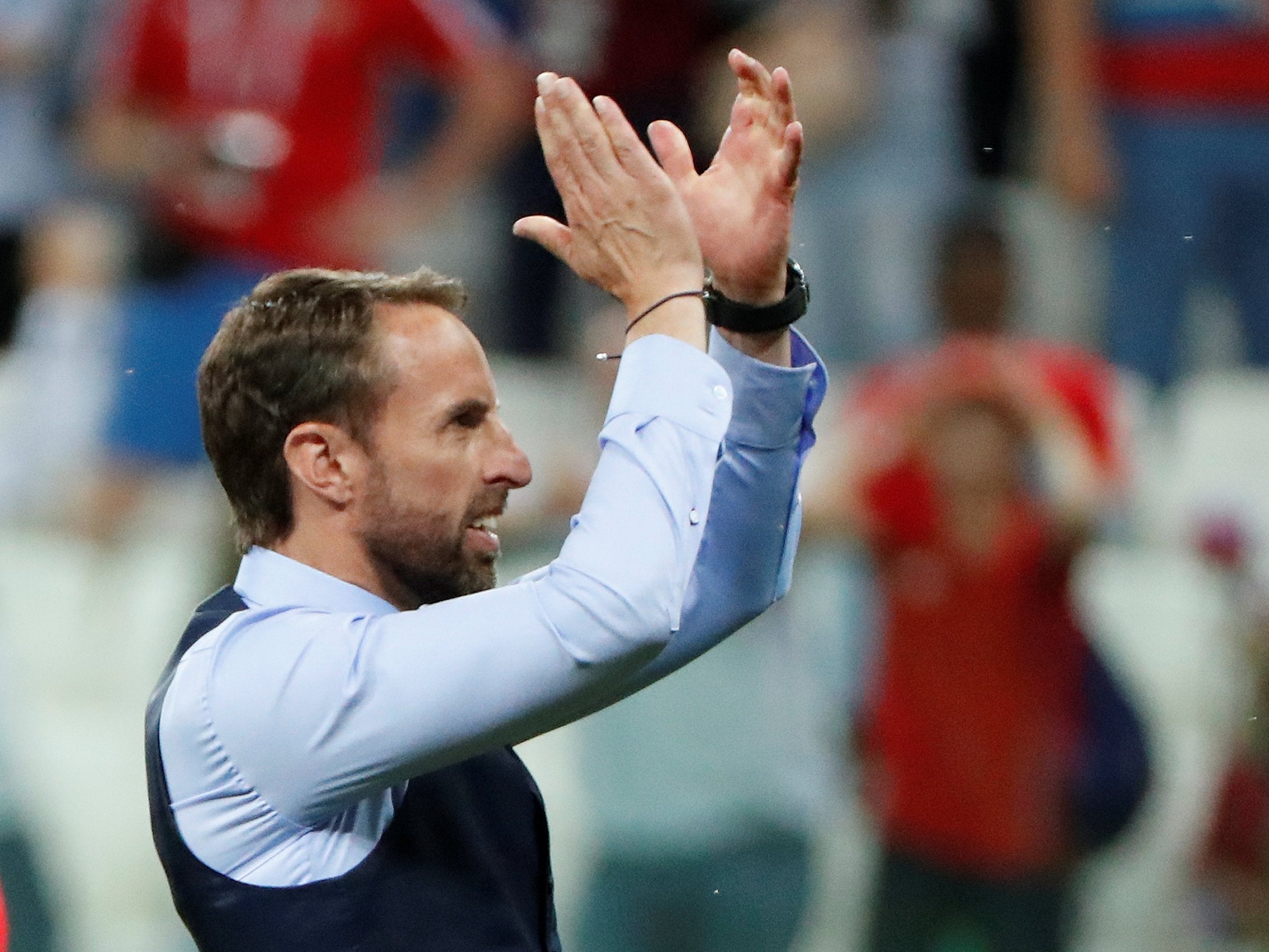World Cup 2018: Gareth Southgate's stubborness proves that sometimes the bravest thing to do is to do nothing at all
Southgate stayed true to the system and the mindset that got England this far and was rewarded by Harry Kane's late winner
Four years is 35,064 hours. And for roughly 35,058 of them - 99.98 per cent of the time - England are not playing a World Cup game. Normal life proceeds in its customary shade of relentless, monotonous monochrome. But for those six hours - if we’re lucky - life takes on a colour and volume that makes it hard to imagine that anything else has ever happened, or ever will. For those six hours, England is a country overcome by the drunkenness of football, the drunkenness of possibility, and inevitably the drunkenness of drunkenness. You may adore the World Cup. You may abhor it. But business as usual it is not.
The point is that the experience of playing for England at a major tournament is subject to myriad external forces that club football, even at the highest level, can never approximate. Lose a league game, and you go again next week. Lose a Champions League final, and there’s always next season. But get knocked out of a World Cup, and - even if you have age on your side - who knows? After Brazil in 2014, Ross Barkley, Luke Shaw and Adam Lallana would all have quietly reckoned on getting a shot at putting things right. Maybe, ultimately, they never will. Four years is a long time. Eight is half a career. Miss this train, and there might never be another.
And so, when you think about it, the wonder is not that England’s players succumb to the weight of expectation, but how they ever manage to resist it. How can you step out into a strange stadium at the outset of a big tournament and not think about the buzz at home, the red and white flags billowing from car fenders and tower blocks, the expectant aunts and uncles watching in their front rooms, the millions standing on tiptoe in pubs trying to get a decent view? How does that not inform everything you do? Talk to players past and present, and they describe it in terms of inspiration as much as inhibition. But to a large degree they’re related, inseparable, two sides of one coin, whose fate rests on a single question: did you win?
So, with all this in mind, let’s return to the Volgograd Arena on Sunday night, with the score England 1-1 Tunisia and - say - 55 minutes on the clock. England haven’t really done anything of note for half an hour. The tempo has dropped. Tunisia have dropped, too: extremely deep. A Mexican wave is beginning to undulate around the stadium. Dele Alli looks like he might be struggling with something. You can already see tomorrow’s back pages: FEZZES 1 SPAZZES 1, or something similarly tasteless. Your name is Gareth Southgate. What do you do?
Well, for most people the natural instinct would be to make a change. And not just one or two changes, but lots. Change the players, for starters. Bring a couple of defenders off and replace them with forwards: Marcus Rashford and Jamie Vardy, whose pace in behind will surely prove the difference against an opponent sitting so far back the only ‘behind’ to speak of is in amongst the photographers. Change the shape: bin the careful 3-5-2 that they have been honing and developing for months and throw everything at an opponent who until recently were ranked 14th in the world, who drew in Portugal and came within six minutes and a few duff bounces of beating Spain. Change the attitude: can’t you make them run faster, somehow? Above all: do something. Anything to placate an impatient nation in grave danger of switching over to ITV.

Instead, Southgate did something rather startling. He did nothing. At least not until the 68th minute, when he made his first substitution, Marcus Rashford replacing Raheem Sterling: essentially a like-for-like swap. In the 80th minute, Ruben Loftus-Cheek replaced Dele Alli: likewise. Southgate did not even bother to use his third substitution - Eric Dier for Jesse Lingard - until deep into injury time, when England were already 2-1 up. But the formation, the gameplan, the strategy and tactics, the basic blueprint that Southgate devised last year and has steadfastly adhered to ever since: on this, there would be no compromise. The message, in toto, was patience. Persistence. Business as usual.
As Southgate later admitted, it was a strategy not without its risks. “Maybe we could have run out of time in the end,” he said. “But we kept making the right decisions. We didn’t flag, we didn’t lob the ball forward aimlessly. The best teams in the world keep that belief in what they’re doing. And in the end, they break the opposition down.”

This, ultimately, was the point. It’s fair to speculate on what the reaction might have been had England’s waiting game not worked. Doubtless, the verdict would have been brutal: a flawed strategy, not enough vigour, not enough tactical flexibility, not enough banshee-panic.
But that discussion will have to wait for another time, because it did work. Tunisia barely penetrated the England half, and Harry Kane’s late winning goal was the perfect vindication. The real point of contrast here was with England’s last tournament game, the defeat to Iceland in 2016, during which Roy Hodgson abandoned all structure and all sanity in favour of ending the game with four strikers - Jamie Vardy, Daniel Sturridge, Rashford and Kane - all on the pitch at once, all bumping into each other.
And interestingly, this precise scenario was one for which Southgate had prepared his team in advance, in team meetings at St George’s Park. “One of the things I wanted to emphasise was that when it’s 1-1, 15 minutes to go, we keep probing, we keep looking for the win, but we don’t expose ourselves in transition,” he said.

“No matter what system we’re playing, we don’t feel like we can get more players into the forward areas. The important thing is that when you are attacking, there’s still some structure to your play. You can put attacking players in various different positions, but then lose shape and you end up being counter-attacked and the game becoming disjointed. What pleased me was we kept control, we kept composure, but the guys who came on had a different sort of threat.”
You might well argue that England were hardly in danger of getting counter-attacked by a team barely venturing beyond its own 18-yard line. And though there was plenty to fault with England's second-half performance - the tempo, the execution and the final ball will all require sharpening before the Panama game on Sunday - at no stage did they relinquish control of the game, or the plot, in the way they have so often done in the past.
In a way, then, this was England’s own small act of rebellion. An assertion of faith. A benediction of the process. A rejection - verging on a repudiation - of the invisible external forces that swirl around every England team at a major tournament, the millions of distant voices in beer gardens and living rooms beseeching them to make a change, go back to the drawing board, bring the pacy lad on, bring the big lad on, lump it, launch it, come on boys, look alive, I don’t care what he does, but he’s got to do something, *it’s the World Cup*.
Perhaps, conversely, when everyone is screaming at you do something, the bravest thing is to do nothing at all.
Join our commenting forum
Join thought-provoking conversations, follow other Independent readers and see their replies
Comments
Bookmark popover
Removed from bookmarks